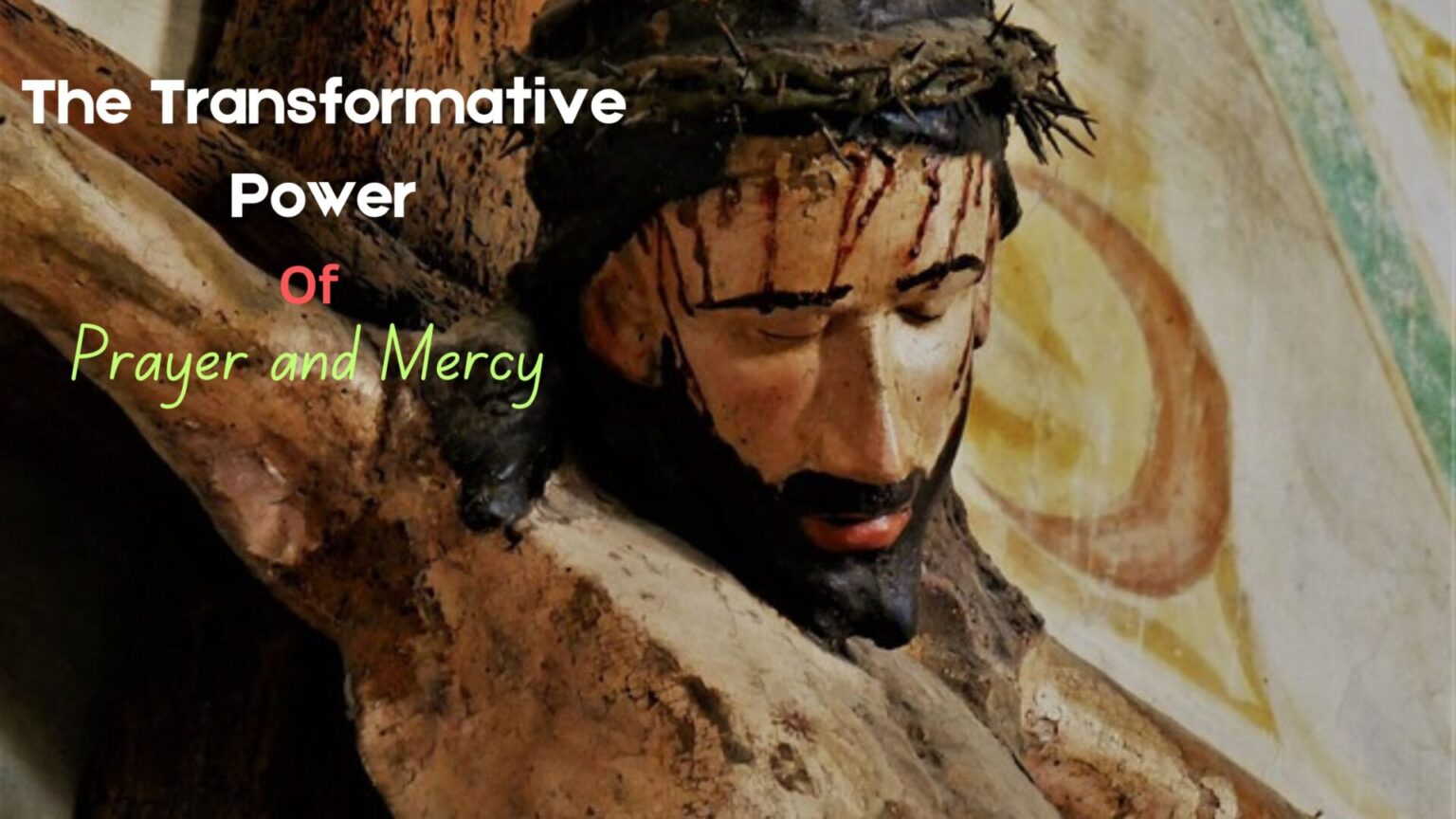Introduction:
“From Heart to Heaven: Unlocking the Transformative Power of Prayer and Mercy”

In the chaos of our modern lives, there’s a timeless practice that offers solace, guidance, and transformation: prayer. Rooted in faith and humility, prayer transcends boundaries, connecting our hearts to the divine. But what makes prayer truly powerful is the mercy it invokes – a mercy that has the potential to uplift, heal, and transform our lives in profound ways.
The Transformative Power of Prayer and Mercy:
When prayer and mercy converge, they create a powerful alchemy of transformation. Through prayer, we surrender our burdens and shortcomings, inviting divine grace into our lives. Through mercy, we find the courage to forgive, the strength to persevere, and the wisdom to embrace life’s challenges with grace and resilience.
Practical Steps Towards a Prayerful Life:
To harness the transformative power of prayer and mercy, we must cultivate a consistent and heartfelt prayer practice. Whether through traditional rituals, silent meditation, or spontaneous conversations with the divine, find a method that resonates with your soul and commit to it with sincerity and devotion.
Embracing the Ripple Effect:
As we deepen our connection to the divine through prayer and mercy, we become conduits of grace and compassion in the world. Our transformed hearts radiate love and kindness, creating a ripple effect that touches the lives of those around us. In this way, the transformative power of prayer and mercy extends far beyond ourselves, shaping the very fabric of our communities and the world at large.
How can prayer transform my life?”

Prayer can be transformative in various ways:
- Connection with the Divine: Prayer is often seen as a direct line of communication with a higher power, whether it’s God, the Universe, or a spiritual force. This connection can provide solace, guidance, and a sense of purpose.
- Clarity and Insight: Through prayer, you can gain clarity about your life, decisions, and challenges. It’s a time for reflection and introspection, which can lead to insights and understanding about yourself and your circumstances.
- Peace of Mind: Engaging in prayer can bring a sense of peace and calmness amidst life’s chaos. It’s an opportunity to surrender worries and anxieties, trusting that there’s a greater plan at work.
- Strength and Resilience: Prayer can provide strength and resilience, especially during difficult times. It offers a source of inner strength and fortitude to face challenges with courage and determination.
- Gratitude and Positivity: Regular prayer cultivates a mindset of gratitude and positivity. By acknowledging blessings and expressing thankfulness, you shift your focus from what’s lacking to what’s abundant in your life.
- Self-Reflection and Growth: Prayer encourages self-reflection and personal growth. It’s a chance to examine your values, beliefs, and behaviors, and strive to align them with your highest aspirations.
- Connection with Others: Prayer can foster a sense of community and connection with others who share your faith or spiritual beliefs. It’s an opportunity to come together, support one another, and uplift each other through collective prayers and intentions.
- Manifestation: Some people believe that prayer has the power to manifest desires and intentions into reality. By focusing your thoughts and energy through prayer, you may attract positive outcomes and experiences into your life.
Ultimately, the transformative power of prayer lies in its ability to deepen your spiritual connection, foster personal growth, and cultivate a greater sense of peace, purpose, and well-being in your life.
What role does mercy play in spiritual growth?”
Mercy plays a significant role in spiritual growth by fostering empathy, compassion, forgiveness, and humility. Here’s how:

- Cultivating Empathy and Compassion: Showing mercy involves understanding and empathizing with others, even when they have wronged you. By cultivating empathy and compassion, you develop a deeper connection with humanity and recognize the inherent worth and dignity of every individual.
- Practicing Forgiveness: Mercy often manifests as forgiveness, releasing resentment and grudges towards those who have hurt or wronged you. Forgiveness is not only liberating for the person extending it but also promotes healing and reconciliation in relationships.
- Fostering Humility: Mercy encourages humility by acknowledging our own vulnerabilities, imperfections, and capacity to err. Recognizing our shared humanity, with all its flaws and limitations, cultivates a humble attitude towards ourselves and others.
- Promoting Healing and Reconciliation: Mercy promotes healing and reconciliation, both internally and externally. By extending forgiveness and understanding, you create space for healing to occur, both within yourself and in your relationships with others.
- Breaking the Cycle of Retribution: Mercy interrupts the cycle of retaliation and retribution by responding to harm with kindness and compassion instead of seeking revenge. It offers an alternative approach to conflict resolution rooted in understanding and reconciliation.
- Reflecting Divine Attributes: Many spiritual traditions emphasize the divine attribute of mercy as a fundamental aspect of God’s nature. By embodying mercy in our own lives, we reflect and honor these divine qualities, deepening our spiritual connection.
- Encouraging Growth and Transformation: Mercy creates an environment conducive to growth and transformation, both individually and collectively. When we approach ourselves and others with compassion and forgiveness, we create space for personal and spiritual development to flourish.
In essence, mercy is not only a virtue but also a catalyst for spiritual growth and maturity. By embodying mercy in our thoughts, words, and actions, we nurture a more compassionate and understanding relationship with ourselves, others, and the divine.
“How does prayer bring solace during difficult times?”
Prayer can bring solace during difficult times in several ways:
- Emotional Outlet: Prayer provides a safe space to express and process emotions such as sadness, fear, anger, and grief. It allows you to pour out your heart to a higher power, knowing that you’re being heard and understood, even in your most vulnerable moments.
- Sense of Presence: Engaging in prayer can evoke a sense of presence and companionship, knowing that you’re not facing your struggles alone. Whether you believe in God, the Universe, or a higher spiritual force, prayer can offer comfort in knowing that there’s a compassionate presence walking alongside you through life’s challenges.
- Connection with Hope: Prayer can renew hope and faith, even in the darkest of times. It reminds you that there’s a larger purpose or divine plan at work, beyond what you can see or understand in the present moment. This hope can sustain you and give you the strength to persevere through adversity.
- Perspective Shift: Through prayer, you can gain a broader perspective on your circumstances, seeing them through the lens of faith and spirituality. This shift in perspective can bring clarity, wisdom, and insight, helping you find meaning and purpose even in the midst of pain and suffering.
- Release of Control: Prayer encourages surrender and release of control over things beyond your power. It’s an opportunity to acknowledge your limitations and trust in a higher wisdom or divine intervention to guide you through challenging times. This surrender can alleviate the burden of trying to shoulder everything on your own.
- Comfort in Ritual and Tradition: Many prayer practices are deeply rooted in ritual and tradition, providing a sense of continuity and connection to something greater than yourself. Engaging in familiar prayers, rituals, or sacred texts can offer a sense of comfort and stability during times of uncertainty and turmoil.
- Healing and Peace: Prayer can be a source of healing and peace, both emotionally and spiritually. It creates a space for reflection, introspection, and inner transformation, allowing you to find moments of stillness, acceptance, and serenity amidst the chaos of life’s challenges.
Conclusion:
From the depths of our hearts to the vastness of the heavens, prayer and mercy are intertwined in a timeless dance of transformation. As we open ourselves to their guiding presence, we unlock the boundless potential within us and embrace a life filled with grace, love, and meaning.
In the journey from heart to heaven, may we find solace, strength, and ultimate fulfillment in the transformative power of prayer and mercy.
Frequently Asked Questions (FAQs)
- What is the significance of prayer in spiritual practice?
Prayer serves as a bridge between the individual and the divine, allowing for communion, guidance, and transformation. It offers a channel for expressing gratitude, seeking guidance, and finding solace in times of need.
- How does mercy enhance the power of prayer?
Mercy encompasses compassion, forgiveness, and unconditional love. When invoked in prayer, mercy amplifies its transformative potential, fostering healing, resilience, and inner peace.
- Can anyone engage in prayer, regardless of religious affiliation?
Yes, prayer is a universal practice that transcends religious boundaries. It’s a deeply personal and spiritual endeavor that can be tailored to individual beliefs, values, and traditions.
- What are some practical ways to incorporate prayer into daily life?
Prayer can take many forms, including silent meditation, recitation of sacred texts, and spontaneous conversations with the divine. Establishing a regular practice, setting aside dedicated time for prayer, and cultivating an attitude of openness and receptivity are key.
- How does prayer and mercy impact personal growth and well-being?
Prayer and mercy nurture qualities such as compassion, resilience, and gratitude, which are essential for personal growth and well-being. They offer a sense of connection, purpose, and inner peace, enabling individuals to navigate life’s challenges with grace and resilience.
References:
- Nouwen, Henri J. M. “The Power of Prayer and Mercy.” The Inner Voice of Love: A Journey through Anguish to Freedom. Image, 1998.
- Kushner, Harold S. “Mercy as a Path to Healing.” The Book of Mercy. Schocken, 1991.
- Keating, Thomas. “Prayer as a Transformative Practice.” Open Mind, Open Heart: The Contemplative Dimension of the Gospel. Continuum, 2002.
- Tolle, Eckhart. “The Power of Presence in Prayer.” The Power of Now: A Guide to Spiritual Enlightenment. New World Library, 1997.
- Kabat-Zinn, Jon. “Mindfulness and Compassion in Prayer.” Coming to Our Senses: Healing Ourselves and the World Through Mindfulness. Hyperion, 2005.






